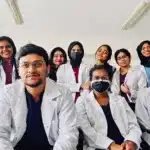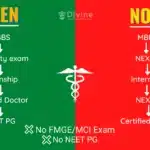
First of all, A HUGE Congratulations on completing your NEET exam.
This is a BIG step in your academic journey, and it’s natural that you will want to take a breather.
But the fight is not over yet, this is also a critical time to think about your next steps and ensure you have a solid plan in place, regardless of the outcome.
One thing I’ve noticed over the years is that many students tend to relax too much after exams, relying heavily on optimism about their results.
While it’s good to be hopeful, it’s equally important to have a Plan B. History shows that it’s wise to prepare for all eventualities—something I learned firsthand when advising my own sister.
Why You Need a Backup Plan:
- Uncertainty of Outcomes: Even with strong performance, NEET rankings can be unpredictable. Having a backup plan ensures you aren’t left in limbo.
- Broadening Your Horizons: Exploring opportunities abroad can provide an excellent alternative path, often with different and sometimes less stringent entry requirements.
- Enhanced Career Prospects:Studying medicine in the U.S., for instance, opens doors to global career opportunities, often with a broader educational experience.

Comparing Educational Systems: India vs. USA
When we look at the educational systems, the comparison between an AIIMS graduate and a medical graduate from USA isn’t straightforward—it’s like comparing apples to oranges.
Educational Structure
In India, students can enter a medical program directly after completing their 12th grade if they pass the NEET exam. This pathway leads to an MBBS degree, which is considered the equivalent of a Bachelor’s degree in Medicine and takes approximately five and a half years to complete, including a mandatory internship.
Conversely, in the USA, students must first complete an undergraduate degree, typically taking four years, before they can apply to a medical school.
This pre-medical degree does not need to be in a science field, but it must include specific prerequisite courses in science.
Following this, the medical program (MD) itself also takes about four years. This structure allows students to obtain a broader educational experience before specializing in medicine.
Focus on Holistic Development
The U.S. education system places significant emphasis on holistic development.
Admission to medical schools in the USA is not solely based on academic performance; it also strongly considers extracurricular achievements, leadership roles, community service, and research experiences.
This approach aims to develop physicians who are not only skilled in medicine but are also well-rounded individuals capable of handling the various social, emotional, and ethical challenges of the profession.
Curriculum and Teaching Methodology
Indian medical education is often criticized for being overly theoretical, with a heavy emphasis on rote learning.
In contrast, U.S. medical schools focus more on problem-solving, critical thinking, and hands-on clinical experience from the early stages of the program.
This is facilitated by the integration of technologies and simulation-based learning, providing a dynamic educational environment that adapts to the evolving landscape of medicine.
Evaluation and Flexibility
The evaluation methods differ as well. In India, the focus is primarily on end-of-year examinations that test knowledge accumulated over the course of the year.
The U.S. system employs continuous assessment, which includes regular tests, quizzes, participation in discussions, and practical exams, alongside major standardized tests like the USMLE (United States Medical Licensing Examination) that students must pass to move forward and eventually practice.

What You Should Do Now:
- Reflect and Research: Take the time now to explore international medical programs, especially in the U.S. Understand the different entry requirements and the holistic approach these institutions take.
- Consult Experts: Reach out for guidance. At Divine, we can help you navigate the complex landscape of studying abroad—from selecting the right program to applying and preparing for departure.
- Prepare Documents and Applications: Start gathering necessary documents and preparing applications for universities abroad. Early preparation can give you a significant advantage.
- Stay Flexible and Open:The path to becoming a successful doctor can take many forms. Be open to exploring paths you may not have considered previously.
The reason I stress this so fervently is because, time and again, I encounter many aspiring students who wish to pursue studies in medicine, yet find themselves overwhelmed and misinformed due to a lack of proper research.
This makes them vulnerable to misinformation from unscrupulous consultants. To safeguard yourself from such pitfalls, I strongly advise you to undertake your own research.
By now, if you’ve been following my emails, you should realize that all the information I provide is grounded in real-world data and scenarios.
I’m not just making things up as we go along; I strive to back up my claims with sources, ensuring you understand where and how this information is derived, helping you become well-informed.
Doing your own research, having a backup plan, preparing your documentation, applying to universities, and maintaining flexibility are essential steps.
If you manage these effectively, whatever the result, you are on your path to becoming a doctor.
This proactive approach is the foundation of Divine Education Abroad Consultancy; it’s the only way to move forward and the process you need to embrace.
If you need any help along the way, remember, We’re here to support you. Feel free to reach out, book a call with us, and let’s get started on your journey to the US.
Why is having a backup plan crucial after the NEET exam?
Even with strong preparation and performance, NEET results can be unpredictable. Having a backup plan ensures you’re not left in limbo, regardless of your results.
What are the benefits of exploring educational opportunities abroad post-NEET?
Studying abroad, particularly in countries like the U.S., offers broader educational experiences, access to advanced technology and research, and potentially greater career opportunities globally.
How does the medical education system in the USA differ from India’s?
The U.S. requires a pre-medical undergraduate degree before entering medical school, focusing more on holistic development and hands-on clinical experience compared to the more theoretical and exam-centric approach in India.
What should NEET candidates do immediately after their exams?
Candidates should begin researching international medical programs, understanding entry requirements, consulting with educational experts, and preparing necessary documents for applications.












